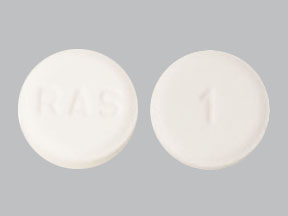
Rasagiline Coupons & Savings Card – Discount Prices from $47.86
Generic for: Azilect
Rasagiline is a medication prescribed for managing symptoms of Parkinson’s disease, including tremors, muscle stiffness, and slow movement. It is particularly effective at reducing "off" times, periods where these symptoms are more pronounced. Rasagiline is taken once daily and is available in both brand-name and generic forms, although it may cause drowsiness in some individuals.
This drug belongs to a group of medications known as monoamine oxidase type B (MAO-B) inhibitors. It works by blocking the MAO-B enzyme, which is responsible for breaking down dopamine in the brain. Since Parkinson’s disease symptoms are linked to low dopamine levels, rasagiline helps by preventing the breakdown of dopamine, thus increasing its levels in the brain and alleviating symptoms. Always consult your healthcare provider to determine if rasagiline is appropriate for your condition.
Our coupons are free to use. Before paying, show the pharmacist your Rasagiline savings card to get your free discount. Use our filters below to edit the prescription box to match your needs. The Rasagiline prices will update based on your prescription needs. Above our Rasagiline coupons, you can change your location to see pharmacy prices and costs in other areas. We're here to help you buy Rasagiline at the lowest price with our prescription discount card.
My prescription
Edit
1MG, Rasagiline (90 Tablets)
Select pharmacy

CVS
$47.86
COUPON PRICE
Albertsons
$106.76
COUPON PRICE
Walgreens
$116.10
COUPON PRICE
Walmart
$120.52
COUPON PRICERasagiline savings card
Show this card to your pharmacist
CVS
$47.86
BIN
ID
PCN
GRP
019876
LH91CDB5A4
CHIPPO
LHX
Powered by
Rasagiline is a medication prescribed for managing symptoms of Parkinson’s disease, including tremors, muscle stiffness, and slow movement. It is particularly effective at reducing "off" times, periods where these symptoms are more pronounced. Rasagiline is taken once daily and is available in both brand-name and generic forms, although it may cause drowsiness in some individuals.
This drug belongs to a group of medications known as monoamine oxidase type B (MAO-B) inhibitors. It works by blocking the MAO-B enzyme, which is responsible for breaking down dopamine in the brain. Since Parkinson’s disease symptoms are linked to low dopamine levels, rasagiline helps by preventing the breakdown of dopamine, thus increasing its levels in the brain and alleviating symptoms. Always consult your healthcare provider to determine if rasagiline is appropriate for your condition.
Our coupons are free to use. Before paying, show the pharmacist your Rasagiline savings card to get your free discount. Use our filters below to edit the prescription box to match your needs. The Rasagiline prices will update based on your prescription needs. Above our Rasagiline coupons, you can change your location to see pharmacy prices and costs in other areas. We're here to help you buy Rasagiline at the lowest price with our prescription discount card.
More prescriptions for Parkinson's disease
coupons from$145.86Save 48%
coupons from$47.05Save 65%
coupons from$89.08Save 93%
coupons from$99.31Save 80%
coupons from$9.92Save 72%
coupons from$5129.88Save 25%
coupons from$330.34Save 87%
coupons from$494.35Save 72%
More prescriptions for Parkinson's disease
Carbidopa Anhydrous Save 48%coupons from $145.86
Stalevo 100 Save 65%coupons from $47.05
Comtan Save 93%coupons from $89.08
Pramipexole ER Save 80%coupons from $99.31
Diphen Save 72%coupons from $9.92
Nuplazid Save 25%coupons from $5129.88
Cycloset Save 87%coupons from $330.34
Osmolex ER Save 72%coupons from $494.35
Rasagiline dosage forms
Use our Rasagiline 0.5MG coupon with prices from $25.49 for 30 Tablets. You can also use our Rasagiline 0.5MG coupon with prices from $47.86 for 90 Tablets. We have a Rasagiline 1MG coupon with prices from $47.86 for 90 Tablets. You can use our Rasagiline 1MG coupon with prices from $25.49 for 30 Tablets.
Dosage Quantity Price from Per unit 0.5MG 30 Tablets $25.49 $0.85 0.5MG 90 Tablets $47.86 $0.53 1MG 90 Tablets $47.86 $0.53 1MG 30 Tablets $25.49 $0.85
| Dosage | Quantity | Price from | Per unit |
|---|---|---|---|
| 0.5MG | 30 Tablets | $25.49 | $0.85 |
| 0.5MG | 90 Tablets | $47.86 | $0.53 |
| 1MG | 90 Tablets | $47.86 | $0.53 |
| 1MG | 30 Tablets | $25.49 | $0.85 |
